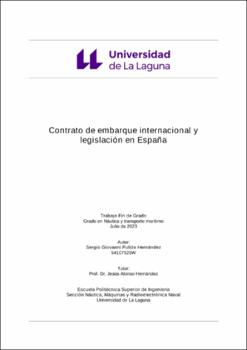Contrato de embarque internacional y legislación en España
Fecha
2023Resumen
Los elementos de extranjería en el medio náutico son inevitables en la mayoría de
transacciones de cualquier tipo. Más concretamente en los últimos años, la globalización es
un hecho fundamental que integra las economías de todo el mundo mediante el comercio y
los flujos financieros, por el cual, los elementos de extranjería son cada vez más recurrentes
y los conflictos legales que se crean, más habituales. En este contexto, los conflictos en
relación a que Ley debe aplicarse para resolver dichos fines, vienen dados por los diferentes
aspectos de extranjería y es necesaria una serie de cuestiones a tener en cuenta para poder
concretarlo.
Hemos realizado esta investigación y recopilación de datos debido a la amplia
desinformación que existe en el ámbito de los contratos marítimos, con respecto a los
trabajadores y la manera más favorable de resolver las disputas que pudieran surgir en este
régimen de trabajo. Con este trabajo, se busca crear un puente sencillo al que acudir para
solucionar las dudas sobre la competencia de los tribunales españoles. Por ello, hemos
hecho un análisis y síntesis de los reglamentos empleados más habituales y una
ejemplificación de cómo aplicarlos de manera simple.
El objetivo es crear una guía para resolver cualquier duda o pregunta con respecto a
la competencia judicial internacional de los tribunales españoles y la determinación de la ley
aplicable sobre litigios con elementos de extranjería para cualquier persona, aunque no
posea conocimientos sobre derecho marítimo. Foreign elements in the nautical sector are unavoidable in most transactions of any
kind. More specifically in recent years, globalization is a fundamental fact that integrates the
economies of the whole world through trade and financial flows, for which, the elements of
foreigners are increasingly recurrent and the legal conflicts that are created, more common.
In this context, the conflicts in relation to which law should be applied to resolve these issues,
are given by the different aspects of foreigners and it is necessary to take into account a
number of issues to define it.
We have carried out this research and data collection due to the wide misinformation
that exists in the field of maritime contracts, with respect to workers and the most favorable
way to resolve disputes that may arise in this work regime. With this study, we seek to create
a simple bridge to go to in order to solve the doubts about the competence of the Spanish
courts. Therefore, we have made an analysis and synthesis of the most commonly used
regulations and an exemplification of how to apply them in a simple way, applying real cases
and fictitious assumptions.
The objective is to create a guide with practical examples to resolve any doubts or
questions regarding the international jurisdiction of the Spanish courts and the determination
of the applicable law on disputes with elements of foreigners for anyone, even if they do not
have knowledge of maritime law.





